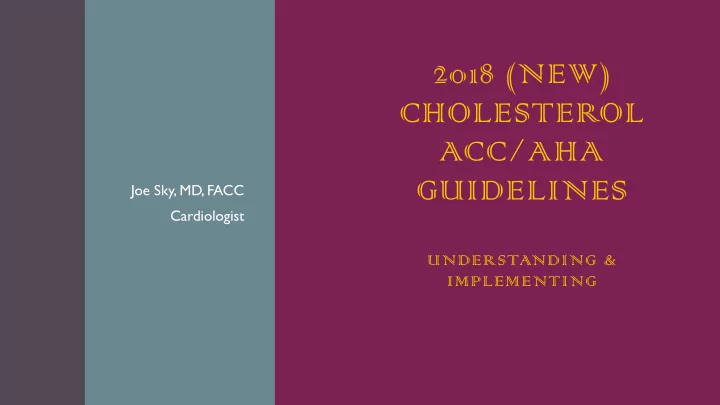

2018 (NEW) CHOLESTEROL ACC/AHA GUIDELINES Joe Sky, MD, FACC Cardiologist UNDERSTANDING & IMPLEMENTING
The views expressed in this presentation are Dr Sky’s and do not reflect an endorsement or the official policy of the the U.S. Government, the Department of Defense, or the U.S. Air Force. Disclosures: 1. Boston Heart Diagnostics, speaker. 2. Blue Zones, speaker.
Outline: 1. Important changes 2. ACC/AHA slide set 3. Coronary calcium history 4. Lipoprotein (a), apoB & HS-crp 5. Implementation ~ resources needed
Changes 1. Lifestyle is has major role – now with monitoring 2. Cholesterol targets are back 3. Work towards patient goals ~ using shared decision making
Changes 4. Serial monitoring ~ Net effect of lifestyle & meds emphasized 5. Team approach (pharmacy, educators, patient) 6. Medications others than statins are back
2013 Statins Risks Lifestyle & Diet
We Can Do Better – Improving the Health of the American People Steven A. Schroeder, M.D.
20% 20% 80% Medical Care Ourselves 80% Our Health
2018 Statins & Other Lifestyle Medications & Diet Risks Enhanced
Lifestyle & Diet
Lifestyle & Diet
Lifestyle & Diet
2018 ACC / AHA Guidelines http://tools.acc.org/ldl/ascvd_risk_estimator/index.html#!/calulate/estimator/
2018 ACC / AHA Guidelines See separate ACC/AHA slides
Coronary Calcium
CALCIUM SCORE • Strength of calcium scoring ~ identification of risk • Key tool for strict safety goals of military aviation, NASA, etc • Outcomes ~ entirely dependent on f/u prevention strategies • Calcium score should lead to more successful outcomes • 2018 cholesterol guidelines offer opportunity
CALCIUM SCORE
CALCIUM SCORE ~ DELAYS IN ACCEPTANCE 1. Over promised with financial profiteering ~ Skepticism in scientific community ~ resentment 2. Use by researchers and clinicians required resources / change ~ Clinical scores didn’t require testing 3. Radiation, incidental findings, etc
CALCIUM SCORE ~ A 2 ND CHANCE? The 2018 ACC/AHA guidelines represent an opportunity ~ Use by researchers and clinicians is shifting ~ Radiation, incidental findings, etc not validated as problems ~ Inclusion in guidelines, perhaps a needed reset in thinking?
OTHER THAN CHOLESTEROL TESTING Lipoprotein (a), apoB & HS-crp ~ National Lipid Association influence ~ Recognition that other tests help delineate risk in patients with “normal" cholesterol ~ Continued debate
OTHER THAN CHOLESTEROL TESTING Negative Positive Disease Disease
WHEN CHOLESTEROL TESTING FAILS PATIENTS? 75% < 130mg/dL 23% <70mg/dL
IMPLEMENTATION ~ RESOURCE NEEDS Time & Personnel changes: Shared decision making & risk-enhancing factors discussions 1. Additional testing: Calcium scoring, labs other than cholesterol 2. Collaborate with the patient for therapy and follow-up ~ Additional professionals, especially clinical pharmacists 3. Healthy lifestyle with relevant advice, materials, or referrals with laboratory monitoring of meds & lifestyle.
Examples of Patient Shared Decision Making What You Can Do: 1. Ask about your 10-year risk score if you don’t already have heart disease 2. Talk about other factors that might increase your risk (called “risk enhancers”) 3. If there’s any doubt, ask if CAC scoring could help After initial visit: 1. Have ongoing discussions about your risk for heart disease, heart attack or stroke keeping in mind risk and available therapies change over time 2. If you are prescribed medication(s), take it as directed, and share any concerns before stopping. 3. Stick to a heart-healthy lifestyle. Enlist your family and others to help support you.
Examples of Patient Shared Decision Making
IMPLEMENTATION Patient resources recommended in new guidelines: https://www.cardiosmart.org/ https://www.heart.org/en/professional/workplace-health/lifes-simple-7 https://www.lipid.org/practicetools/tools/tearsheets/practicetools/careers/ jobdescriptions https://www.lipid.org/CLMT http://tools.acc.org/ASCVD-Risk-Estimator-Plus/#!/calculate/estimate/ https://statindecisionaid.mayoclinic.org
MY PRINCIPLES Customized care that reflect patient's need, values & choices FOR PREVENTIVE ~ constructive follow-up. CARE Screening for risks. Serial follow up testing for motivation! Medications and treatments after diet and lifestyle and patient selected interventions. Seek answers ~ evidence based approach to best medicine, diet and lifestyle
Questions
Recommend
More recommend